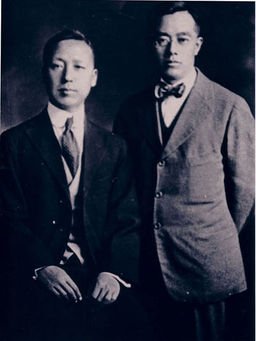Kim Kyu-sik
Kim Kyu-sik (born January 29, 1881 in Busan, then Korea, now South Korea; † December 10, 1950 near Manpo, North Korea) was a Korean politician and independence activist. He was vice president of the Provisional Government of the Republic of Korea.
He was born in Dongnae (now a part of Busan) and was orphaned at an early age. He was educated by US missionaries and was given the name "Johann" by them. He later traveled to the United States and earned a bachelor's degree from Roanoke College in Virginia. He then studied at Princeton, earning a master's degree there in 1904.
In 1905, Kim returned to Korea and took up a teaching position. After Korea was annexed by the Japanese Empire in 1910, Kim went into exile in China.
As a plenipotentiary of the Provisional Government, Kim Kyu-sik went to Paris to seek Korean independence from Japan at the Paris Peace Conference in 1919. He was sent by Yuh Woon-hyung and Chang Duk-soo, who had established the Sinhan Cheongnyeondang in Shanghai in the summer of 1919. His efforts proved fruitless, however, as the U.S. considered President Woodrow Wilson's 14-point program on the right of peoples to self-determination less important in favor of Japan, then an ally.
In 1922 Kim was a delegate to the First Congress of Communist and Revolutionary Organizations of the Far East in Moscow.
He was awarded a doctorate in law from Roanoke College in Salem, Virginia, in 1923. In 1935, he founded the People's Revolutionary Party (민족혁명당) in Nanjing. He was a leading member of the Provisional Government of the Republic of Korea, of which he became vice president in 1940 under Kim Gu.
After Korea's independence from Japan at the end of World War II in 1945, he returned to his homeland once again to help establish an independent state. The country was divided into two occupation zones between the Soviet Union and the USA. The American military government preferred Kim together with Yuh Woon-hyung as moderate politicians for the establishment of a new government. In September 1947, the U.S. put the Korean issue on the agenda of the UN, which had been established a few years earlier. It was decided to hold elections in South Korea in 1948, regardless of the objections of Korean politicians.
After all efforts to unify Korea failed, Kim retired from politics. When the Korean War broke out in 1950, he was kidnapped and taken to the North. There he died a short time later near Manpo on December 10, 1950.

Rhee Syng-man and Kim Kyu-sik in Shanghai
Search within the encyclopedia